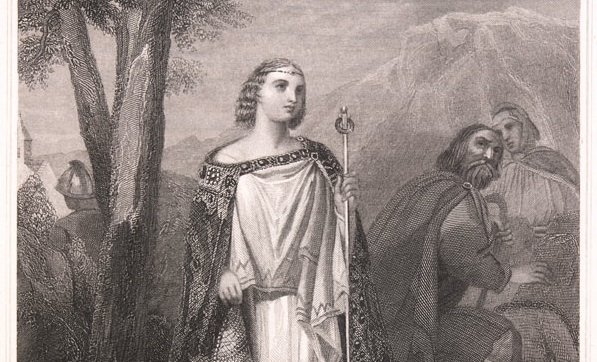Aoife is one of several female Irish warriors whose names are popular today. Photo by Courtesy Flickr/BiblioArchives/LibraryArchives
One of the most interesting things about Irish culture is the unique names--and pronunciation of those names--that have resulted from the linguistic shift from old Irish to modern English. While traveling in Ireland, I got to meet a lot of my distant Irish relatives, and I loved trying to guess the spelling of my great-aunts' and third-cousins' names based on the way they were pronounced. For example, would you ever think a name pronounced "Neev" would be spelled "Niamh"? Irish names also have some really cool meanings, often stemming from ancient folklore. Here are a few of my favorites.
FEMALES
Maeve
Pronunciation: mave (may + v)
Maeve is probably my favorite Irish name, meaning "the cause of great joy" or "she who intoxicates"--or, in racier translations, "she who makes men drunk." It comes from the old Irish name Madb, the great warrior queen of Connacht.
Aoife
Pronunciation: ee + fah
Coming from another female warrior, a daughter of a king of Connacht whose marriage St. Patrick himself arranged. Aoife means "beautiful, radiant, joyful."
Ciara
Pronunciation: kee + rah
This name comes from the Irish word "ciar," which means "dark." It is the feminine form of Ciaran--both names imply dark hair and eyes.
Grainne
Pronunciation: gran + ya or grawn + ya
Grainne comes from "gran," which means "grain" or "corn," and Grainne was the patron of the harvest in ancient Ireland. Legends also exist of a Grainne who was daughter to an Irish high king. She jilted a fiance to run away with a lover named Diarmuid--but, due to the fiance's pursuit, the couple could not spend two consecutive nights in the same place.
Niamh
Pronunciation: neev or nee + iv
The legend of Niamh and Oisin tells the story of "Niamh of the Golden Hair," the daughter of the sea god, who fell in love with Oisin. They lived in Tir-na-nOg, where, in what seemed like three weeks, 300 years passed. Niamh means "radiance, luster, brightness."
Kathleen
Pronunciation: kath + leen
Now isn't that a beautiful name? Kathleen is the Irish form of Katherine (or Cathleen from Catherine), which means "pure." It became such a popular name that poet W.B. Yeats chose it for his heroine in his 1899 play "The Countess Cathleen."
MALES
Liam
Pronunciation: lee + am
Liam is a popular name across the world, but it began as the Irish form of William--which came from "will" + "helm," (helm meaning helmet), suggesting "strong protector."
Oisin
Pronunciation: o + shee + in or osh + een
In folklore, Oisin was the lover of "Niamh of the Golden Hair." But before he met Niamh, Oisin lived in the forest until he was 7 years old, raised by his mother, whom a Dark Druid had turned into a deer. Oisin's father found him and gave him his name, which means "little deer."
Aengus
Pronunciation: eng + iss
Aengus was the god of love and youth, with a name deriving from "aon" ("excellent") and "gus" ("strength, vigor"). The god Aengus fell in love with a woman in a dream and worked to win her love by passing trials, including transforming into a swan. William Butler Yeats wrote of his quest in the poem, "The Song of Wandering Aengus." Other variations are spelled Aonghus or Oengus.
Clooney
Pronunciation: cloon + ee
Although most associated with everyone's favorite perennial bachelor, George, in Ireland, Clooney is a first name as well. It comes from the Irish word "cluain," which means "a green plain or pasture," but also connotes "an intriguing rogue."
Connor
Pronunciation: con + er or con + or
Another name that has gained popularity outside Ireland, Connor means "lover of hounds."
Niall
Pronunciation: nye + al
In legends, Niall of the Nine Hostages became a king by passing a test. He and his brothers were sent to a forest to find shelter, food and drink. After growing thirsty, they found a well that a "hideously ugly" woman guarded. She asked for a kiss before giving them water. Niall was the only of the brothers to agree--when he kissed her, she turned into "the most beautiful woman on earth" and gave him the throne. The name Niall means "passionate, vehement."
Brian
Pronunciation: bree + an
Brian is one of the most widespread Irish names, although its American counterpart is usually pronounced "bry + an." It comes from the Irish word "brigh," meaning "high, noble, strong." It gained popularity after the most revered high king of Ireland, Brian Boru, died of battle wounds after defeating an invading Viking army in 1014.
Source: babynamesofireland.com



Comments
Use the comment form below to begin a discussion about this content.
comments powered by Disqus